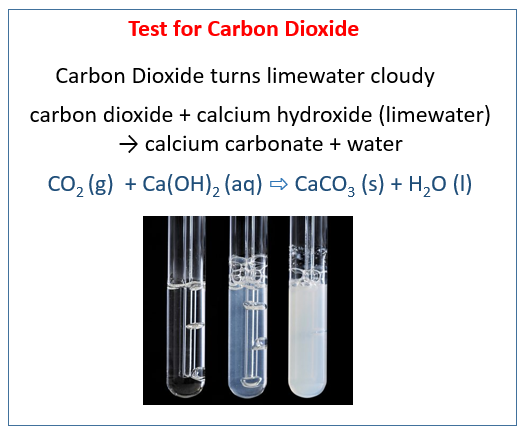Fun Science Projects & Experiments - Limewater Test
Related Pages
Alkane And Alkene Tests
Science projects, videos and experiments for various grades and topics.
In these lessons, we shall learn the limewater test for carbon dioxide - how it works and how to use it.
The limewater test is a chemical test used to detect the presence of carbon dioxide (CO2). When carbon dioxide is bubbled through limewater (a solution of calcium hydroxide, Ca(OH)2), it reacts to form a white precipitate of calcium carbonate (CaCO3), which makes the limewater turn cloudy. This is a classic test in chemistry and is often used to confirm the presence of CO2 in a gas sample or in exhaled air.
Science Projects or Science Experiments: Grades 5 & 6
The following diagrams show the test for Carbon Dioxide. Carbon Dioxide will turn limewater (calcium hydroxide) cloudy. Scroll down the for examples and explanations.

Limewater Test - To check for carbon dioxide in your breath
Lime Water Breath Experiment
Using lime water is a fun and easy way to test for the presence of carbon dioxide. The exhaled
carbon dioxide is used to produce a precipitate of calcium carbonate with the lime water.
carbon dioxide + calcium hydroxide (limewater) → calcium carbonate + water
Procedure:
- Add 50 ml of lime water to two 100 ml beakers.
- Bubble room air through one beaker for one minute using a pipette and pipette pump. Observe and record the results.
- With the other beaker, bubble exhaled air through the solution for 1 minute. Try to bubble the air through the same rate that you did with the first beaker. After 1 minute record your results.
How the Limewater Test Works
- Reaction:
Carbon dioxide reacts with calcium hydroxide to form calcium carbonate and water:
CO2 + Ca(OH)2 → CaCO3 + H2O.
Calcium carbonate is insoluble in water, so it forms a white precipitate, making the limewater appear cloudy. - Observation:
If the gas being tested contains CO2, the limewater will turn from clear to cloudy.
Limewater & CO2
Carbon dioxide dissolves in water to form carbonic acid (H2CO3).
Lime water is a solution of calcium hydroxide (Ca(OH)2).
They react to form calcium carbonate (CaCO3) and water. Calcium carbonate is insoluble and forms a white precipitate.
If CO2 continues to be passed, more carbonic acid forms, which then reacts with the calcium carbonate to form calcium hydrogencarbonate, which is soluble, so the precipitate is seen to dissolve.
To Investigate the Carbon Dioxide Levels of Inhaled and Exhaled Air
In this experiment we will investigate the carbon dioxide levels of inhaled and exhaled air.
We use limewater to test for the presence of carbon dioxide.
Carbon dioxide dissolves in water
Here is some pure water, which has a pH of 7, shown by using this testing paper and matching the
color to the chart on the side of the box.
If I take a straw and blow into the water, what gases are going into the water?
The one I am interested in is carbon dioxide, which can dissolve in water and react to form an acid.
CO2(g) + H2O(l) → H2CO3(aq) → H+(aq) + HCO3−(aq)
So after I blow into the water several times, I should have a solution which is more acid than it was before. Let’s check by retesting the pH of the solution. It is now down to 5, rather than the 7 it was as pure water. pH 5 is an acid, so the carbon dioxide has dissolved in the water and reacted.
Thus my chemical reaction really has made hydrogen ions in the water, meaning that the carbon dioxide gas dissolved and reacted.
CO2(g) + H2O(l) → H+(aq) + HCO3−(aq)
What does this mean about rain which passes through air with CO2 in it?
Try the free Mathway calculator and
problem solver below to practice various math topics. Try the given examples, or type in your own
problem and check your answer with the step-by-step explanations.

We welcome your feedback, comments and questions about this site or page. Please submit your feedback or enquiries via our Feedback page.